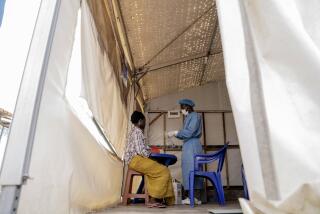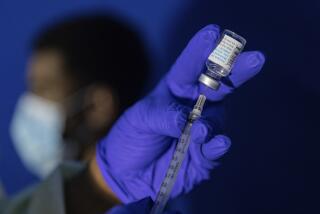Smallpox destruction put off for three years -- minimum
Those last vials of smallpox, tucked away by the U.S. and Russia and due for destruction, have won at least another three years in existence -- suggesting other countries concur with the U.S. about their value, one leading health official said.
Delegates at the annual meeting of the World Health Organization agreed on Tuesday to wait until 2014 to decide on a firm deadline for the final destruction of the lethal virus, Reuters reports.
The World Health Organization has called for the destruction of such stockpiles since the disease was declared eradicated in 1980. The U.S., meanwhile, has argued that researchers need time to develop safe vaccines and antivirals in case other sources of smallpox are discovered.
The latest decision indicates that other countries agree with the U.S. position, says Nils Daulaire, director of the Office of Global Health Affairs at the U.S. Department of Health and Human Services.
“In the past, assemblies have called for immediate destruction or for setting a date for destruction. The tenor of the debate really was much more oriented toward the recognition it would be time for us to have countermeasures,” said Daulaire in a phone interview.
Such countermeasures include new, safer vaccines. The smallpox vaccine that eradicated smallpox during the 20th century was not much more sophisticated than the original 1796 vaccine by Edward Jenner, says Daulaire. Those vaccines contained a live virus, which carries life-threatening risks for people with compromised immune systems, such as those with HIV/AIDS or cancer patients undergoing chemotherapy. Newer vaccines without a live virus are being developed, Daulaire said, and must be safety tested like any other vaccine.
In addition to vaccines, two or possibly three antivirals that could treat people infected with smallpox would be necessary in case of an outbreak, Daulaire said. One such antiviral, currently known as ST-246, is being developed under a 5-year contract awarded in May by Health and Human Services.
Daulaire says he believes the virus will eventually be destroyed, but he wouldn’t speculate about what deadline the WHO might set in 2014.
“We’ve urged that the deadline not be set on the basis on a certain number of years, but based on when the science is at the point that there’s no need for stocks of smallpox,” Daulaire said.
RELATED: Could smallpox still be lurking in labs and museums?
RELATED: Smallpox stockpile could be destroyed; a look at what the virus wrought.
RELATED: More news from HealthKey






